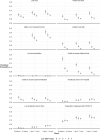Are we all in this together? Longitudinal assessment of cumulative adversities by socioeconomic position in the first 3 weeks of lockdown in the UK
- PMID: 32503892
- PMCID: PMC7298206
- DOI: 10.1136/jech-2020-214475
Are we all in this together? Longitudinal assessment of cumulative adversities by socioeconomic position in the first 3 weeks of lockdown in the UK
Abstract
Background: Despite media claims that coronavirus disease 2019 (COVID-19) is uniting societies and countries in shared experience, there has been concern that the pandemic is in fact exposing and widening existing inequalities within societies. Data have shown these differences for cases and fatalities, but data on other types of adversities are lacking. Therefore, this study explored the changing patterns of adversity relating to the COVID-19 pandemic by socioeconomic position (SEP) during the early weeks of lockdown in the UK.
Methods: Data were from 12 527 UK adults in the University College London COVID-19 Social Study (a panel study that involves online weekly data collection from participants during the COVID-19 pandemic). We analysed data collected from 25 March to 14 April 2020. The sample was well-stratified and weighted to population proportions of gender, age, ethnicity, education and country of living. We used Poisson and logit models to assess 10 different types of adverse experiences depending on an index of SEP over time.
Results: There was a clear gradient across the number of adverse events experienced each week by SEP. This was most clearly seen for adversities relating to finances (including loss of employment and cut in income) and basic needs (including access to food and medications) but less for experiences directly relating to the virus. Inequalities were maintained with no reductions in discrepancies between socioeconomic groups over time.
Conclusions: There were clear inequalities in adverse experiences during the COVID-19 pandemic in the early weeks of lockdown in the UK. Results suggest that measures taken to try to reduce such adverse events did not go far enough in tackling inequality.
Keywords: Cohort studies; EPIDEMIOLOGY; MENTAL HEALTH; PSYCHOSOCIAL FACTORS; PUBLIC HEALTH.
© Author(s) (or their employer(s)) 2020. Re-use permitted under CC BY. Published by BMJ.
Conflict of interest statement
Competing interests: None declared.
Figures


Comment in
-
COVID-19: exposing and amplifying inequalities.J Epidemiol Community Health. 2020 Sep;74(9):681-682. doi: 10.1136/jech-2020-214720. Epub 2020 Jul 15. J Epidemiol Community Health. 2020. PMID: 32669357 Free PMC article. No abstract available.
References
-
- Alipio M. Do socio-economic indicators associate with COVID-2019 cases? Findings from a Philippine study. Rochester, NY: Social Science Research Network, 2020.
-
- Nassif-Pires L, Xavier L, de L, et al. Pandemic of inequality. Levy Economics Institute. 2020. Available https://ideas.repec.org/p/lev/levppb/ppb_149.html (accessed 22 Apr 2020).
MeSH terms
Grants and funding
LinkOut - more resources
Full Text Sources
Miscellaneous
